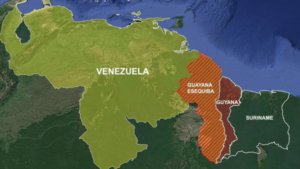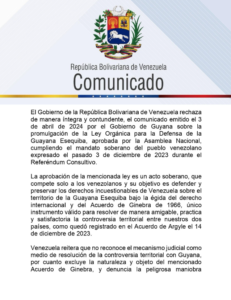Guyana-Venezuela Territorial disputes escalate

Venezuelan President Nicolás Maduro’s decision to enact into law the outcomes of a recent referendum asserting ownership over two-thirds of Guyana has sparked intense condemnation from the neighbouring South American nation’s government, Guyana on Thursday.
The referendum held by President Maduro in early December last year, aimed to assert Venezuela’s sovereignty over the resource-rich region of Essequibo, which constitutes nearly 70% portion of Guyana. He argued that this territory had been unlawfully taken during the drawing of the border more than a century ago. Maduro further emphasized the referendum’s significance during a signing ceremony on Wednesday, labelling it as a “stellar and historic moment.”

What does the law aim to do?
The specifics of the law termed, “the Organic law for the defence of Guyana Essequibo”, has not been promptly disclosed.
Nevertheless, Guyana’s Ministry of Foreign Affairs has adamantly stated its refusal to cede any territory to Venezuela.
Prez. Dr. Mohamed Irfan Ali has criticized the move targeting Guyana’s western Essequibo region as a flagrant violation of the fundamental principles of international law.
Guyanese officials have issued strong objections to Prez Maduro’s claims, time and again insisting that Venezuela has no authority to exert sovereignty on the Essequibo region and any settlement of land boundary disputes should be settled in the International Court of Justice.
With many geo-politics experts speculating the Essequibo region’s richness in newly discovered natural resources has prompted Venezuela’s President Maduro to escalate the decades old dispute.
Guyana and Venezuela lay claim to Essequibo
The Essequibo region has been a flashpoint for Guyana and Venezuela for decades, but tensions escalated significantly following the discovery of extensive oil deposits near Guyana’s coastline in 2015.
Particularly in offshore areas that overlap with the disputed territory. The Guyanese government had awarded U.S -based oil and gas company, Exxon Mobil Corporation’s oil production rights after the company discovered the presence of natural oil reserves in the Starbroek block, of offshore Guyana.
Shortly after the signing of the law, Maduro tweeted on Thursday, “The decision of December 3 has now become a Law of the Republic, to form part of the legal structure of the internal political and institutional movement of our country. Today we receive a Law ratified in its organic nature by the TSJ; and with the power given to me by the constitution, the decision made by the Venezuelans in the consultative referendum will be fulfilled in all its parts, and with this Law, we will continue the defence of Venezuela on international stages.”

President Maduro also called Guyanese President Dr. Mohamed Irfan Ali a “puppet” of ExxonMobil, the United Kingdom, and the United States of America.
Hours later, Prez Dr. Mohamed Irfan Ali responded sharply tweeting, “If Venezuela wants to contest title to the territory in question, the proper forum is the International Court of Justice, which will decide the issue objectively and according to the law. Furthermore, the offensive and undignified statements made by President Maduro about the President of the Cooperative Republic of Guyana have not gone unnoticed. It is unfortunate that the commitment made at Argyle to “the pursuance of good neighbourliness, peaceful coexistence, and the unity of Latin America and the Caribbean” is now again seriously threatened by President Maduro’s words and action today.”
International Court of Justice, yet to decide ruling
Guyana had taken the case to the International Court of Justice, back in 2018. The Guyanese government claims in accordance with the 1966 Geneva Agreement, the nation has control on the Essequibo region as per the settlements on the 1899 Arbitral Award. Whereas Venezuela, argues that the 1966 agreement nullifies the original arbitration. The court ruling on the matter is expected early next year.
The two countries have witnessed numerous treaties and settlements over decades of disputes, resulting in the formation of complex geo-politics scenario in the region. US satellite images have recorded that Venezuela is amassing troops & establishing new bases on the Essequibo border region.
Guyana has also stepped up its military collaboration with U.S, India and France to strengthen its military in the event of Venezuelan annexation. With army recruitment camps being conducted across Guyana as well as social media campaigns.
In mid-December last year, Prez Ali (Guyana) and Prez Maduro (Venezuela), had convened on the eastern Caribbean Island of St. Vincent, after calls by regional leaders to de-escalate tensions. However, they were unable to settle the territorial dispute, instead pledged to refrain from using threats or force against one another.











